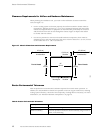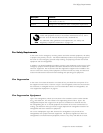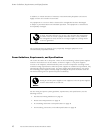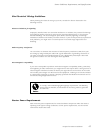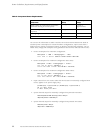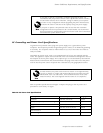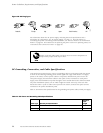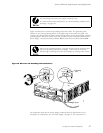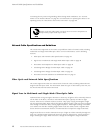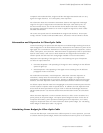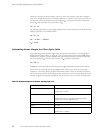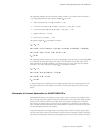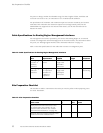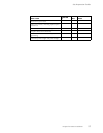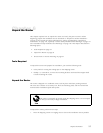
Network Cable Spe
cifications and Guidelines
connecting the DC power and grounding cables during initial installation, see “Connect
Power to a DC-Powered Router” on p age 66. For instructions on replacing the cables on an
operating rou
ter, see “Disconnect and Connect DC Power” on page 108.
Power cords and cables must not block access to router components or
drape where people could trip on them.
Network Cable Specifications and Guidelines
The various
PICs supported o n the router accept different kinds of network cable, including
multimodeandsingle-modefiber-opticcable. Formoreinformation,seethefollowing
sections:
• Fiber Optic and Network Cable Specifications on page 48
• Signal Loss in Multimode a nd Single-Mode Fiber-Optic Cable on page 48
• Attenuation and Dispersion in Fiber-Optic Cable on page 49
• Calculatin
g Power Budget for Fiber-Optic Cable on page 49
• Calculating Power Margin for Fiber-Optic Cable on page 50
• Attenuate to Prevent Saturation at SONET/SDH PICs on page 51
Fiber Optic and Network Ca ble Specifications
The router supports PICs that use various kinds of network cable, including multimode and
single-mode fiber-optic cable. For information about the type of cable used by each PIC, see
the M5 and M1
0 Internet Routers PIC Guide.
Signal Loss in Multimode and Single-Mode Fiber-Optic Cable
Multimode
fiber is large enough in diameter to allow rays of light to reflect internally (bounce
off the walls of the fiber). Interfaces with multimode optics typically use LEDs as light
sources. LEDs are not coherent sources, however. They spray varying wavelengths of light
into the mu
ltimode fiber, w hich reflects the light at different angles. Light rays travel in jagged
lines through a multimode fiber, causing signal dispersion. W hen light traveling in the fiber
core radiates into the fiber cladding, higher-order mode loss (HOL) results. Together these
factors l
imit th e transmission distance of m ultimod e fiber compared to single-mode fiber.
Single-mode fib er is so small in diameter that rays of light can reflect internally through one
layer onl
y. Interfaces with single-mode optics use lasers as light sources. Lasers generate a
single wavelength of light, which travels in a straight line through the single-mode fib er.
48 M5 and M10 Internet Routers Hardware Guide



